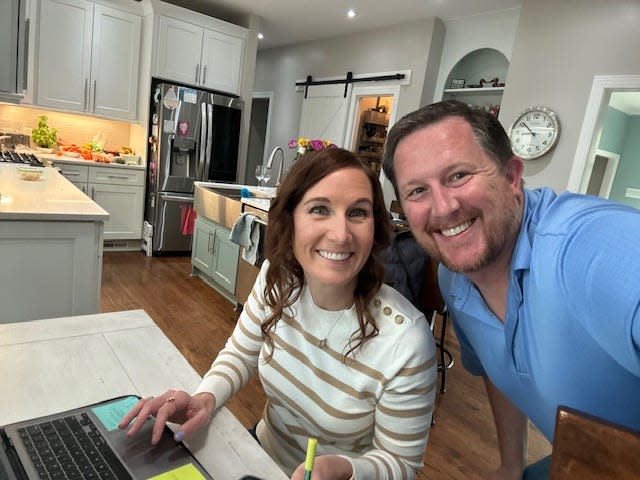Uncomfortable Conversations: What is financial infidelity and how can you come clean?
Welcome back to Uncomfortable Conversations About Money, a new series where we will tackle topics or situations around money that make you uneasy. We'll outline the problem and try to get you some usable solutions.
The dilemma:
A wife with a habit of buying – and hiding – expensive shoes from her husband.
A husband with a secret online gambling addiction.
A partner racking up credit card debt for purchases the other partner doesn’t know about.
These are all examples of financial infidelity.
But what is financial infidelity?

“At its core, financial infidelity is a breach of trust around what you're doing or not doing with money,” said Ed Coambs, a financial therapist.
“When we're in financial infidelity, we're doing it because we're either trying to protect ourselves from feeling some relational pain or from them experiencing or me evoking something inside of them that's uncomfortable,” he said.

Coambs is the past president of the Financial Therapy Association, an organization of professionals with combined therapy and financial planning expertise. He's also the author of "The Healthy Love & Money Way,'' and hosts a podcast called "Healthy Love and Money."
Financial infidelity can violate any type of relationship, including a spouse or partner, sibling, parent, friend, employer, or – “here’s the real kicker, against yourself,” Coambs said.
You're being unfaithful to yourself when you are not realistic about your finances or avoid your relationship with money, “so we're kind of cheating on our own integrity around what we want to be doing with money,” he said.

More broadly, financial infidelity usually happens when there’s “likely something that's happening in that relationship that's making it not safe or acceptable to be honest or transparent about how you're spending money,” Coambs said. “When we fear criticism or shame or judgment for what we're doing with money, we're much more likely to start hiding what we're doing.”
That may mean hiding your shopping habits or purchases, Coambs said. But Coambs has also had patients who have failed to pay personal or business taxes, and parents who don’t want to disclose their financial problems to their adult children when it comes to estate planning.
More than 40% of people have committed financial infidelity
Financial infidelity is rather prevalent in relationships. In a 2021 study, the National Endowment for Financial Education found that two in five (43%) people in a relationship confess to having committed some act of financial deception, with 85% stating that indiscretion affected the current/past relationship in some way.
In a more recent study by marketing solutions company Vericast, 53% of people believe hiding finances from a significant other is a betrayal of trust.
Business stress, lack of self-worth led to therapist's financial infidelity
Coambs committed financial infidelity himself about seven years ago in his marriage. He and his wife, Ann, had agreed that Coambs would use credit cards to start his new therapy business. The agreed-upon amount was about $10,000.
But building the business proved more difficult than Coambs anticipated. Coambs said his own feelings of self-worth and not wanting to admit to his wife, who had a thriving business, that he was not successful, caused him to accumulate $30,000 in debt – without telling her.
“When it came to light, she was really disappointed,” Coambs said. “She was frustrated, and she was left with more financial responsibility because her business and her practice was growing and successful.”
His not wanting to disappoint his wife resulted in him betraying her instead.
“It led to some really difficult conversations,” he said.

Coambs said for him and some of his patients, there’s this stacking of expectations that can’t be met, “and then we felt like we couldn't talk about it. And so we were stuck in secrecy. And that secrecy then grew into shame and that's just such a difficult space to free ourselves. It's like a dark hole.”
Coambs and his wife sought out couples therapy to work out the reasons Coambs felt he had to hide the debt and to figure out how they could repair their relationship.
No one reason for financial infidelity
Since there is such a wide range of financial infidelity, there are different reasons for why it might occur, he said.
For instance, a secret gambling addiction is rooted in a mental health issue, which is layered into infidelity, Coambs said.
Coambs said there may also be cultural differences – one spouse may feel stuck between a cultural expectation to provide support to parents and a partner who doesn’t share or understand that obligation. A similar situation can come up with adult children when one parent thinks financial support is required while the other doesn’t, Coambs said.
When it's self-protection, not infidelity
Yet another scenario is a spouse or partner who is in a dangerous relationship and feels the need to put money aside to help them get out of it.
Coambs said in that instance, it is not considered financial infidelity, but financial self-protection.
“The time that you can be fully honest and transparent about your finances is when there's enough relational safety, when you have a reasonable expectation that your partner can actually shift from anger and disappointment to compassion and empathy,” Coambs said.
The expert advice
So how does someone who has committed financial infidelity come clean?
“In an ideal world, you would have enough emotional resolve or maturity to be able to come to your partner and just say, ‘I need to invite you into a difficult conversation about our finances. Are you in a place where we can talk about something that's likely to make both of us uncomfortable?’ "Coambs said. That sets the stage so “we're not blinding them psychologically with the news.”
Coambs said most patients have told him they want to be able to talk to their partner in a safe, accountable and respectful way "because they don't want to do regrettable things or say regrettable things when this comes out,” he said.
What’s advice for the other party? Coambs said infidelity is often discovered by a partner, employer, or friend because some type of documentation or other evidence comes to light.
Likely, the person is going to have “some pretty big emotional reactions, or you might go numb,” he said. There should be the acknowledgment that you are hurt and caught off guard.
Uncomfortable Conversations: Being a bridesmaid is expensive. Can or should you say no?
Some people who receive the news of financial infidelity react by journaling or reading, talking to a therapist, or mindfulness practices.
“It's a time to be honest with yourself about what's going on, because your partner may not be in a place where they're ready to be honest with you, which really compounds the exposure of financial infidelity,” he said.
That may also be a signal that you and your partner could use professional help, Coambs said.
A financial therapist can be a neutral third party.
“We can stay in a place of suspending any judgment about any one person and what they've done,'' Coambs said, "and we can bring curiosity, compassion and empathy to all parties involved to try to help them come back together around what does it mean to have this money between us and how do we find some place of safety and acceptance.”
We want to hear from you
Here's the next Uncomfortable Conversations about Money we want to tackle:
◾ Do you have an adult child who is financially ready to leave the house but won't?
◾ Did you go on vacation with friends and were their spending habits so different that it made it awkward?
Do you have an Uncomfortable Conversations about Money topic you'd like to suggest? Or would you be willing to be featured in a future story about your Uncomfortable Conversation? Email blinfisher@USATODAY.com with "Uncomfortable Conversations" in the subject line.
Betty Lin-Fisher is a consumer reporter for USA TODAY. Reach her at blinfisher@USATODAY.com or follow her on X, Facebook, or Instagram @blinfisher. Sign up for our free The Daily Money newsletter, which will include consumer news on Fridays, here.
This article originally appeared on USA TODAY: Financial infidelity can breed mistrust. Here's how to come clean.

 Yahoo Finance
Yahoo Finance 